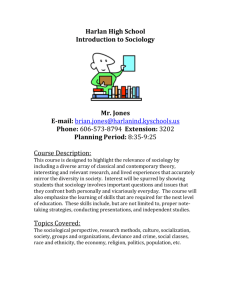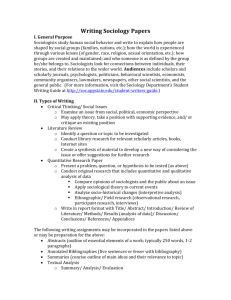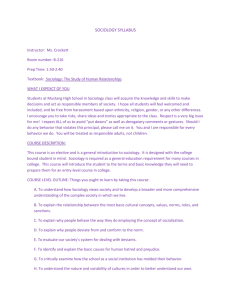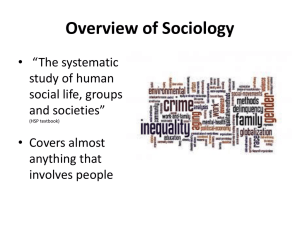SOC-100-006 Peter Maidstone
advertisement
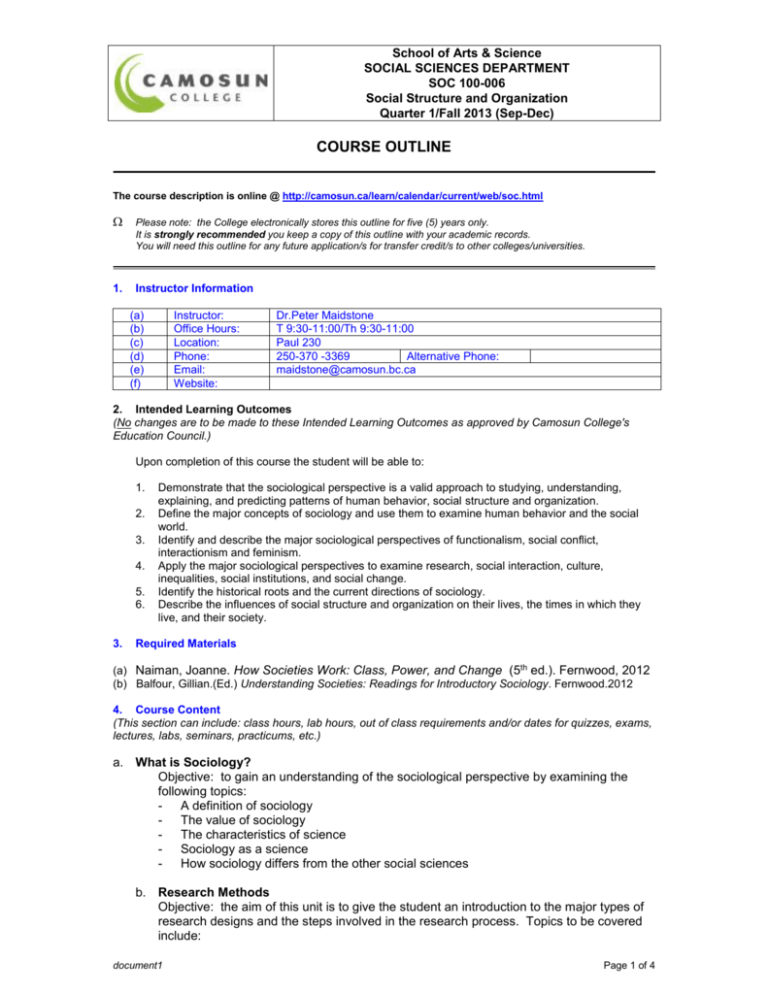
School of Arts & Science SOCIAL SCIENCES DEPARTMENT SOC 100-006 Social Structure and Organization Quarter 1/Fall 2013 (Sep-Dec) COURSE OUTLINE The course description is online @ http://camosun.ca/learn/calendar/current/web/soc.html 1. Please note: the College electronically stores this outline for five (5) years only. It is strongly recommended you keep a copy of this outline with your academic records. You will need this outline for any future application/s for transfer credit/s to other colleges/universities. Instructor Information (a) (b) (c) (d) (e) (f) Instructor: Office Hours: Location: Phone: Email: Website: Dr.Peter Maidstone T 9:30-11:00/Th 9:30-11:00 Paul 230 250-370 -3369 Alternative Phone: maidstone@camosun.bc.ca 2. Intended Learning Outcomes (No changes are to be made to these Intended Learning Outcomes as approved by Camosun College's Education Council.) Upon completion of this course the student will be able to: 1. 2. 3. 4. 5. 6. 3. Demonstrate that the sociological perspective is a valid approach to studying, understanding, explaining, and predicting patterns of human behavior, social structure and organization. Define the major concepts of sociology and use them to examine human behavior and the social world. Identify and describe the major sociological perspectives of functionalism, social conflict, interactionism and feminism. Apply the major sociological perspectives to examine research, social interaction, culture, inequalities, social institutions, and social change. Identify the historical roots and the current directions of sociology. Describe the influences of social structure and organization on their lives, the times in which they live, and their society. Required Materials (a) Naiman, Joanne. How Societies Work: Class, Power, and Change (5th ed.). Fernwood, 2012 (b) Balfour, Gillian.(Ed.) Understanding Societies: Readings for Introductory Sociology. Fernwood.2012 4. Course Content (This section can include: class hours, lab hours, out of class requirements and/or dates for quizzes, exams, lectures, labs, seminars, practicums, etc.) a. What is Sociology? Objective: to gain an understanding of the sociological perspective by examining the following topics: - A definition of sociology - The value of sociology - The characteristics of science - Sociology as a science - How sociology differs from the other social sciences b. Research Methods Objective: the aim of this unit is to give the student an introduction to the major types of research designs and the steps involved in the research process. Topics to be covered include: document1 Page 1 of 4 c. What is methodology? What are the different approaches to doing research? (quantitative vs. qualitative) Types of research designs, and the special uses of each. The Problem of Knowledge Objective: to develop an awareness of the problems sociology faces in differentiating itself from common sense knowledge and establishing itself as a science. Topics to be examined include: - Is sociology a science? (an analysis of this debate) - The value-free debate - The Hawthorn effect - Culture-free concepts - Sociology and its involvement in the "real" world - What is social reality? - Is reality constructed? - Subjectivity and science d. Models of Society Objective: to convey to the student an understanding of a number of current major paradigms in sociology, and the roots of these perspectives in the work of the "classical" theorists. The student will be given an insight into the differences between the functionalist, conflict, interactionist, and feminist paradigms. The substantive topics to be explored in terms of the above aims are social stratification, deviance, gender, and politics. e. The Question of Human Nature Objective: the aim of this section is to make the student aware of the various conceptions of human nature which underpin the paradigms which have been examined. This unit will focus on the implications of each conception of human nature for the type of social organization that is possible, and how these implications are expressed in social theories. document1 Page 2 of 4 f. Introduction to Social Theory Objective: to introduce the student to sociological theory and to trace its roots to social theory. Topics to be covered include: - A definition of theory. - The differentiation between common sense, sociological, and social theory. - The history of social theory. - The relationship of the emergence of social theory to the development of sociology as a discipline. - The relationship of theory to ideology. - The approach and uses of the sociology of knowledge. g. Karl Marx Objective: the aim of this unit is to impart to the student an understanding of the dialectical paradigm, and a materialist perspective. Marx's views of social class, social change, historical development, consciousness, and ideology will be examined with the intention of illustrating the contrast between a critical and a positivist interpretation of society. h. Empowering Knowledge Objective: the aim of the final unit is to draw some conclusions about the role that sociological knowledge can play in enabling us to take control of, or, as one author puts it, “restore balance” to our lives, our society, and the planet. 5. Basis of Student Assessment (Weighting) (This section should be directly linked to the Intended Learning Outcomes.) First Exam: (30%) The exam will be an "objective style" multiple-choice exam, but will attempt to test one's conceptual rather than factual knowledge. It will focus on material covered to date in the course, and will be written in class on October 10. Second Exam: (35%) The second exam will have the same format as the first. It will be based on material covered in the lectures and readings. It will be written in class on November 7. Third Exam: (15%) The third exam will retain the same format as the other exams. It will focus upon areas covered since the second exam. It will be written in class December 5. First Essay (10%): Each student is responsible for completing a seven hundred and fifty word typewritten analysis of a current Canadian newspaper or magazine article. This assignment, which will be explained more fully in class, will be evaluated on a Pass-Fail basis. A copy of the article together with the analysis is due October 24. Second Essay: (10%) Each student is responsible for completing a seven hundred and fifty word typewritten analysis of the textbooks. This assignment, which will be explained more fully in class, will be evaluated on a Pass-Fail basis. A copy of the analysis is due November 21. 6. Grading System (No changes are to be made to this section unless the Approved Course Description has been forwarded through the Education Council of Camosun College for approval.) Standard Grading System (GPA) Percentage 90-100 85-89 80-84 77-79 73-76 document1 Grade A+ A AB+ B Description Grade Point Equivalency 9 8 7 6 5 Page 3 of 4 70-72 65-69 60-64 BC+ C 50-59 D 0-49 F 4 3 2 Minimum level of achievement for which credit is granted; a course with a "D" grade cannot be used as a prerequisite. Minimum level has not been achieved. 1 0 Temporary Grades Temporary grades are assigned for specific circumstances and will convert to a final grade according to the grading scheme being used in the course. See Grading Policy E-1.5 at camosun.ca for information on conversion to final grades, and for additional information on student record and transcript notations. Temporary Grade I IP CW 7. Description Incomplete: A temporary grade assigned when the requirements of a course have not yet been completed due to hardship or extenuating circumstances, such as illness or death in the family. In progress: A temporary grade assigned for courses that, due to design may require a further enrollment in the same course. No more than two IP grades will be assigned for the same course. (For these courses a final grade will be assigned to either the 3rd course attempt or at the point of course completion.) Compulsory Withdrawal: A temporary grade assigned by a Dean when an instructor, after documenting the prescriptive strategies applied and consulting with peers, deems that a student is unsafe to self or others and must be removed from the lab, practicum, worksite, or field placement. Recommended Materials or Services to Assist Students to Succeed Throughout the Course LEARNING SUPPORT AND SERVICES FOR STUDENTS There are a variety of services available for students to assist them throughout their learning. This information is available in the College calendar, at Student Services, or the College web site at camosun.ca. STUDENT CONDUCT POLICY There is a Student Conduct Policy which includes plagiarism. It is the student’s responsibility to become familiar with the content of this policy. The policy is available in each School Administration Office, at Student Services, and the College web site in the Policy Section. ADDITIONAL COMMENTS AS APPROPRIATE OR AS REQUIRED document1 Page 4 of 4



